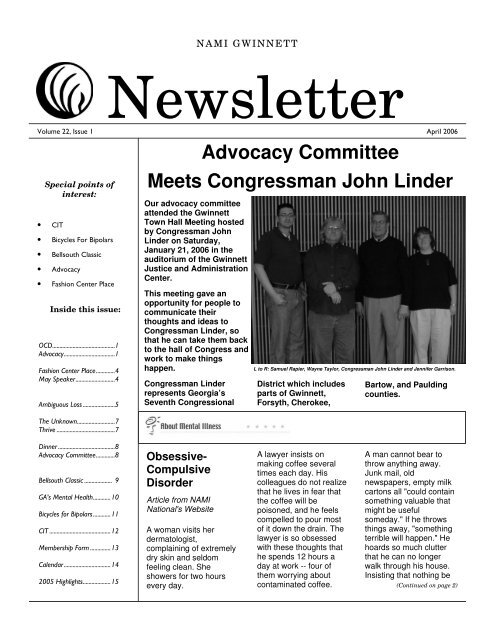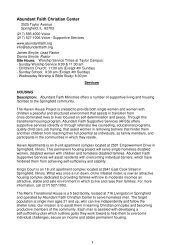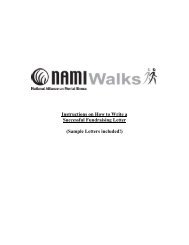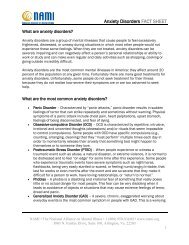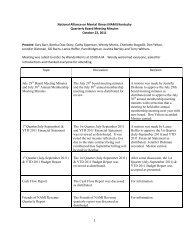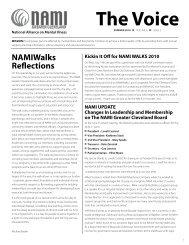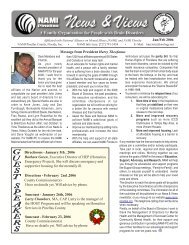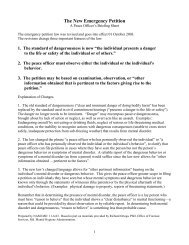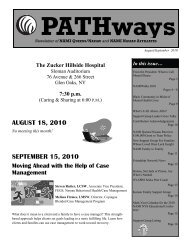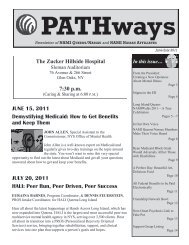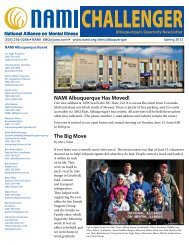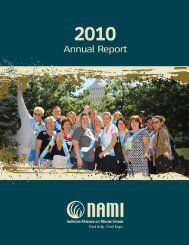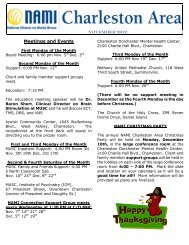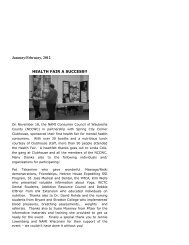Advocacy Committee Meets Congressman John Linder - NAMI
Advocacy Committee Meets Congressman John Linder - NAMI
Advocacy Committee Meets Congressman John Linder - NAMI
Create successful ePaper yourself
Turn your PDF publications into a flip-book with our unique Google optimized e-Paper software.
•<br />
•<br />
•<br />
•<br />
•<br />
Special points of<br />
interest:<br />
Inside this issue:<br />
! "<br />
# $ % &<br />
# &<br />
<strong>NAMI</strong> GWINNETT<br />
Newsletter<br />
'<br />
'<br />
( )<br />
* + , -<br />
( . (<br />
/# 0<br />
0--" , "<br />
1<br />
Our advocacy committee<br />
attended the Gwinnett<br />
Town Hall Meeting hosted<br />
by <strong>Congressman</strong> <strong>John</strong><br />
<strong>Linder</strong> on Saturday,<br />
January 21, 2006 in the<br />
auditorium of the Gwinnett<br />
Justice and Administration<br />
Center.<br />
This meeting gave an<br />
opportunity for people to<br />
communicate their<br />
thoughts and ideas to<br />
<strong>Congressman</strong> <strong>Linder</strong>, so<br />
that he can take them back<br />
to the hall of Congress and<br />
work to make things<br />
happen.<br />
<strong>Congressman</strong> <strong>Linder</strong><br />
represents Georgia’s<br />
Seventh Congressional<br />
Obsessive-<br />
Compulsive<br />
Disorder<br />
Article from <strong>NAMI</strong><br />
National's Website<br />
A woman visits her<br />
dermatologist,<br />
complaining of extremely<br />
dry skin and seldom<br />
feeling clean. She<br />
showers for two hours<br />
every day.<br />
<strong>Advocacy</strong> <strong>Committee</strong><br />
<strong>Meets</strong> <strong>Congressman</strong> <strong>John</strong> <strong>Linder</strong><br />
L to R: Samuel Rapier, Wayne Taylor, <strong>Congressman</strong> <strong>John</strong> <strong>Linder</strong> and Jennifer Garrison.<br />
District which includes<br />
parts of Gwinnett,<br />
Forsyth, Cherokee,<br />
A lawyer insists on<br />
making coffee several<br />
times each day. His<br />
colleagues do not realize<br />
that he lives in fear that<br />
the coffee will be<br />
poisoned, and he feels<br />
compelled to pour most<br />
of it down the drain. The<br />
lawyer is so obsessed<br />
with these thoughts that<br />
he spends 12 hours a<br />
day at work -- four of<br />
them worrying about<br />
contaminated coffee.<br />
Bartow, and Paulding<br />
counties.<br />
A man cannot bear to<br />
throw anything away.<br />
Junk mail, old<br />
newspapers, empty milk<br />
cartons all "could contain<br />
something valuable that<br />
might be useful<br />
someday." If he throws<br />
things away, "something<br />
terrible will happen." He<br />
hoards so much clutter<br />
that he can no longer<br />
walk through his house.<br />
Insisting that nothing be<br />
(Continued on page 2)
(Continued from page 1)<br />
! "!# $%! !& '%()! $$(!<br />
thrown away, he moves to another<br />
house where he continues to hoard.<br />
A 10 year old girl keeps apologizing for<br />
"disturbing" her class. She feels that<br />
she is too restless and is clearing her<br />
throat too loudly. Her teachers are<br />
puzzled and over time become<br />
annoyed at her repeated apologies<br />
since they did not notice any sounds or<br />
movements. She is also preoccupied<br />
with "being good all the time".<br />
These people suffer from obsessivecompulsive<br />
disorder (OCD). The<br />
National Institute of Mental Health<br />
estimates that more than 2 percent of<br />
the U.S. population, or nearly one out<br />
of every 40 people, will suffer from<br />
OCD at some point in their lives. The<br />
disorder is two to three times more<br />
common than schizophrenia and<br />
bipolar disorder.<br />
What is Obsessive-Compulsive<br />
Disorder?<br />
Obsessions are intrusive, irrational<br />
thoughts -- unwanted ideas or<br />
impulses that repeatedly well up in a<br />
person's mind. Again and again, the<br />
person experiences disturbing<br />
thoughts, such as "My hands must be<br />
contaminated; I must wash them"; "I<br />
may have left the gas stove on"; "I am<br />
going to injure my child." On one level,<br />
the sufferer knows these obsessive<br />
thoughts are irrational. But on another<br />
level, he or she fears these thoughts<br />
might be true. Trying to avoid such<br />
thoughts creates great anxiety.<br />
Compulsions are repetitive rituals such<br />
as hand washing, counting, checking,<br />
hoarding, or arranging. An individual<br />
repeats these actions, perhaps feeling<br />
momentary relief, but without feeling<br />
satisfaction or a sense of completion.<br />
People with OCD feel they must<br />
perform these compulsive rituals or<br />
something bad will happen.<br />
Most people at one time or another<br />
experience obsessive thoughts or<br />
compulsive behaviors. Obsessivecompulsive<br />
disorder occurs when an<br />
individual experiences obsessions and<br />
compulsions for more than an hour<br />
each day, in a way that interferes with<br />
his or her life.<br />
OCD is often described as "a disease<br />
of doubt." Sufferers experience<br />
"pathological doubt" because they are<br />
unable to distinguish between what is<br />
possible, what is probable, and what is<br />
unlikely to happen.<br />
Who gets OCD?<br />
People from all walks of life can get<br />
OCD. It strikes people of all social and<br />
ethnic groups and both males and<br />
females. Symptoms typically begin<br />
during childhood, the teenage years or<br />
young adulthood.<br />
What causes OCD?<br />
A large body of scientific evidence<br />
suggests that OCD results from a<br />
chemical imbalance in the brain. For<br />
years, mental health professionals<br />
incorrectly assumed OCD resulted<br />
from bad parenting or personality<br />
defects. This theory has been<br />
disproved over the last 20 years. OCD<br />
symptoms are not relieved by<br />
psychoanalysis or other forms of "talk<br />
therapy," but there is evidence that<br />
behavior therapy can be effective,<br />
alone or in combination with<br />
medication. People with OCD can<br />
often say "why" they have obsessive<br />
thoughts or why they behave<br />
compulsively. But the thoughts and the<br />
behavior continue.<br />
People whose brains are injured<br />
sometimes develop OCD, which<br />
suggests it is a physical condition. If a<br />
placebo is given to people who are<br />
depressed or who experience panic<br />
attacks, 40 percent will say they feel<br />
better. If a placebo is given to people<br />
who experience obsessive-compulsive<br />
disorder, only about two percent say<br />
they feel better. This also suggests a<br />
physical condition.<br />
Clinical researchers have implicated<br />
certain brain regions in OCD. They<br />
have discovered a strong link between<br />
OCD and a brain chemical called<br />
serotonin. Serotonin is a<br />
neurotransmitter that helps nerve cells<br />
communicate.<br />
Scientists have also observed that<br />
people with OCD have increased<br />
metabolism in the basal ganglia and<br />
the frontal lobes of the brain. This,<br />
scientists believe, causes repetitive<br />
movements, rigid thinking, and lack of<br />
spontaneity. Successful treatment with<br />
medication or behavior therapy<br />
produces a decrease in the overactivity<br />
of this brain circuitry. People<br />
with OCD often have high levels of the<br />
hormone vasopressin.<br />
In layperson's terms, something in the<br />
brain is stuck, like a broken record.<br />
Judith Rapoport, M.D., describes it in<br />
her book, The Boy Who Couldn't Stop<br />
Washing, as "grooming behaviors<br />
gone wild."<br />
How do people with OCD typically<br />
react to their disorder?<br />
People with OCD generally attempt to<br />
hide their problem rather than seek<br />
help. Often they are remarkably<br />
successful in concealing their<br />
obsessive-compulsive symptoms from<br />
friends and co-workers. An unfortunate<br />
consequence of this secrecy is that<br />
people with OCD generally do not<br />
receive professional help until years<br />
after the onset of their disease. By that<br />
time, the obsessive-compulsive rituals<br />
may be deeply ingrained and very<br />
difficult to change.<br />
How long does OCD last?<br />
OCD will not go away by itself, so it is<br />
important to seek treatment. Although<br />
symptoms may become less severe<br />
from time to time, OCD is a chronic<br />
disease. Fortunately, effective<br />
treatments are available that make life<br />
with OCD much easier to manage.<br />
Is age a factor in OCD?<br />
OCD usually starts at an early age,<br />
often before adolescence. It may be<br />
mistaken at first for autism, pervasive<br />
developmental disorder, or Tourette's<br />
syndrome, a disorder that may include<br />
obsessive doubting and compulsive<br />
touching as symptoms.<br />
Like depression, OCD tends to worsen<br />
as the person grows older, if left<br />
untreated. Scientists hope, however,<br />
that when the OCD is treated while the<br />
person is still young, the symptoms will<br />
(Continued on page 3)
'%()! $$(!<br />
(Continued from page 2)<br />
not get worse with time.<br />
What are other examples of<br />
behaviors typical of people who<br />
suffer from OCD?<br />
People who do the following may have<br />
OCD:<br />
• repeatedly check things, perhaps<br />
dozens of times, before feeling<br />
secure enough to go to sleep or<br />
leave the house. Is the stove off?<br />
Is the door locked? Is the alarm<br />
set?<br />
• fear they will harm others.<br />
Example: A man's car hits a<br />
pothole on a city street and he<br />
fears it was actually a body.<br />
• feel dirty and contaminated.<br />
Example: A woman is fearful of<br />
touching her baby because she<br />
might contaminate the child.<br />
• constantly arrange and order<br />
things. Example: A child can't go to<br />
sleep unless he lines up all his<br />
shoes correctly.<br />
• are excessively concerned with<br />
body imperfections -- insist on<br />
numerous plastic surgeries, or<br />
spend many, many hours a day<br />
body-building.<br />
• are ruled by numbers, believing<br />
that certain numbers represent<br />
good and others represent evil.<br />
• are excessively concerned with sin<br />
or blasphemy.<br />
Is OCD commonly recognized by<br />
professionals?<br />
Not nearly commonly enough. OCD is<br />
often misdiagnosed, and it is often<br />
under diagnosed. Many people have<br />
dual disorders of OCD and<br />
schizophrenia, or OCD and bipolar<br />
disorder, but the OCD component is<br />
not diagnosed or treated. In children,<br />
parents often are aware of some<br />
anxiety or depression but not of the<br />
underlying OCD. Researchers believe<br />
OCD, anxiety disorders, Tourette's,<br />
and eating disorders such as anorexia<br />
and bulimia can be triggered by some<br />
"!# $%! !&<br />
of the same chemical malfunctioning of<br />
the brain.<br />
Is heredity a factor in OCD?<br />
Yes. Heredity appears to be a strong<br />
factor. If you have OCD, there's a 25percent<br />
chance that one of your<br />
immediate family members will have it.<br />
It definitely seems to run in families.<br />
Can OCD be effectively treated?<br />
Yes, with medication and behavior<br />
therapy. Both affect brain chemistry,<br />
which in turn affects behavior.<br />
Medication can regulate serotonin,<br />
reducing obsessive thoughts and<br />
compulsive behaviors.<br />
Anafranil (clomipramine): A tricyclic<br />
antidepressant, Anafranil has been<br />
shown to be effective in treating<br />
obsessions and compulsions. The<br />
most commonly reported side effects<br />
of this medication are dry mouth,<br />
constipation, nausea, increased<br />
appetite, weight gain, sleepiness,<br />
fatigue, tremor, dizziness,<br />
nervousness, sweating, visual<br />
changes, and sexual dysfunction.<br />
There is also a risk of seizures,<br />
thought to be dose-related. People<br />
with a history of seizures should not<br />
take this medication. Anafranil should<br />
also not be taken at the same time as<br />
a monoamine oxidase inhibitor (MAOI).<br />
Many of the antidepressant<br />
medications known as selective<br />
serotonin reuptake inhibitors (SSRIs)<br />
have also proven effective in treating<br />
the symptoms associated with OCD.<br />
The SSRIs most commonly prescribed<br />
for OCD are Luvox (fluvoxamine), Paxil<br />
(paroxetine), Prozac (fluoxetine), and<br />
Zoloft (sertraline).<br />
Luvox (fluvoxamine): Common side<br />
effects of this medication include dry<br />
mouth, constipation, nausea,<br />
sleepiness, insomnia, nervousness,<br />
dizziness, headache, agitation,<br />
weakness, and delayed ejaculation.<br />
Paxil (paroxetine): Side effects most<br />
associated with this medication include<br />
dry mouth, constipation, nausea,<br />
decreased appetite, sleepiness,<br />
insomnia, tremor, dizziness,<br />
nervousness, weakness, sweating,<br />
and sexual dysfunction.<br />
!*<br />
Prozac (fluoxetine): Dry mouth,<br />
nausea, diarrhea, sleepiness,<br />
insomnia, tremor, nervousness,<br />
headache, weakness, sweating, rash,<br />
and sexual dysfunction are among the<br />
more common side effects associated<br />
with this drug.<br />
Zoloft (sertraline): Among the side<br />
effects most commonly reported while<br />
taking Zoloft are dry mouth, nausea,<br />
diarrhea, constipation, sleepiness,<br />
insomnia, tremor, dizziness, agitation,<br />
sweating, and sexual dysfunction.<br />
Celexa (Citalopram) Side effects may<br />
include dry mouth, nausea, or<br />
drowsiness .<br />
SSRIs should never be taken at the<br />
same time as MAOIs.<br />
How log should an individual take<br />
medication before judging its<br />
effectiveness?<br />
Some physicians make the mistake of<br />
prescribing a medication for only three<br />
or four weeks. That really isn't long<br />
enough. Medication should be tried<br />
consistently for 10 to 12 weeks before<br />
its effectiveness can be judged.<br />
What is behavior therapy, and can it<br />
effectively relieve symptoms of<br />
OCD?<br />
Behavior therapy is not traditional<br />
psychotherapy. It is "exposure and<br />
response prevention," and it is<br />
effective for many people with OCD.<br />
Consumers are deliberately exposed<br />
to a feared object or idea, either<br />
directly or by imagination, and are then<br />
discouraged or prevented from<br />
carrying out the usual compulsive<br />
response. For example, a compulsive<br />
hand-washer may be urged to touch<br />
an object he or she believes is<br />
contaminated and denied the<br />
opportunity to wash for several hours.<br />
When the treatment works well, the<br />
consumer gradually experiences less<br />
anxiety from the obsessive thoughts<br />
and becomes able to refrain from the<br />
compulsive actions for extended<br />
periods of time.<br />
(Continued on page 4)
(Continued from page 3)<br />
!+ "!# $%! !& '%()! $$(!<br />
Several studies suggest that medication and behavior therapy are equally effective in alleviating symptoms of OCD.<br />
About half of the consumers with this disorder improve substantially with behavior therapy; the rest improve moderately.<br />
Will OCD symptoms go away completely with medication and behavior therapy?<br />
Response to treatment varies from person to person. Most people treated with effective medications find their symptoms<br />
reduced by about 40 percent to 50 percent. That can often be enough to change their lives, to transform them into<br />
functioning individuals.<br />
A few consumers find that neither treatment produces significant change, and a small number of people are fortunate to<br />
go into total remission when treated with effective medication and/or behavior therapy.<br />
Eric Spencer, President<br />
Claudia Haxton, 1 st Vice President/Program Chair<br />
Open position, 2 nd Vice President/Membership<br />
Chair<br />
Carol McEntee, Treasurer<br />
Debbie Taylor, Recording Secretary<br />
Open position, Corresponding Secretary<br />
Reviewed by Judith Rapoport, MD May 2003<br />
Fashion Center Place in Need of Spring/Summer Clothing Donations<br />
THE FASHION CENTER PLACE will be receiving donations on Tuesdays and Thursdays<br />
between 9am and 1pm. Debbie Elrod will need to be called by the front desk. So if you have<br />
a donation ask whoever is out front to get her. Also donations can be brought to the board<br />
meetings, and regular once a month meeting. You might want to call the center at 770-995-<br />
6902 to make sure Debbie is at the center or you can contact Claudia Haxton at 770-338-0701<br />
and she will make arrangements with whomever wants to donate for pickup. Claudia Haxton<br />
Marti Vogt speaker for May Meeting<br />
Marti Vogt is Chairperson for the Suicide Prevention Coalition of Georgia and Coordinator of a number<br />
of support services including grief and care giving at the Counseling Network at Perimeter<br />
Church.<br />
Marti has over 24 years of experience in suicide prevention and has conducted numerous workshops<br />
and presentations on suicide, grief and crisis. She was Assistant Director of Suicide Prevention and<br />
Volunteer Services at North Central Mental Health (the home of the Suicide Prevention Center). She<br />
was involved in planning and implementing the Teen Suicide Prevention Hotline in Columbus, Ohio<br />
that later won the President’s Volunteer Action Award in 1987.<br />
Marti has also coordinated fundraising events, training for volunteers working suicide hotlines and<br />
other volunteer related ministries and programs. She has also conducted seminars on grief for adults and<br />
children. She also served as Community Liaison for Caring Answering and Listening and Linking/<br />
Volunteer Action Center in Columbus, Ohio (CALL/VAC). She will be speaking on Saving Lives in<br />
Georgia (A community awareness education presentation). Written by Claudia Haxton<br />
Lois Damron<br />
Debbie Elrod<br />
Daphne Nash<br />
Diane Turman<br />
Kim Whitehill<br />
To ensure that you continue to<br />
receive the National, State, and<br />
<strong>NAMI</strong> Gwinnett mailings, please<br />
notify us whenever you have a<br />
change of address.
'%()! $$(!<br />
Loss. It’s something most of us<br />
are familiar with, or eventually<br />
will be at some point in our lives.<br />
Inevitably we are destined to<br />
experience the pain associated<br />
with the loss of a loved one for<br />
example. In fact, one might<br />
even say that loss is an integral<br />
part of life and the human<br />
condition. We cannot escape it.<br />
Subsequently, we must stand<br />
and face our grief and loss,<br />
following the rituals society has<br />
set forth for us, ultimately<br />
allowing us to come to terms<br />
with and make peace with the<br />
pain we have experienced,<br />
thereby allowing us to find a<br />
sense of closure.<br />
There is another type of loss,<br />
however, that often does not<br />
find closure. This is the sense<br />
of loss experienced by the<br />
families of individuals with<br />
mental disorders. This feeling<br />
of unresolved grief and loss is<br />
often referred to as “ambiguous<br />
loss.”<br />
In the case of a mental disorder,<br />
the family members of the<br />
diagnosed individual often feel<br />
as though they have lost that<br />
individual to the disorder.<br />
Essentially the person they<br />
knew is dead, replaced by a<br />
stranger with their loved one’s<br />
face. The sense of grief and<br />
loss experienced by the family<br />
members of an individual with a<br />
mental disorder often goes and<br />
remains unrecognized by others<br />
around them. This leads to a<br />
feeling of “ambiguous loss.”<br />
Ambiguous loss may be defined<br />
in three different ways: 1)The<br />
loss is characterized by a lack of<br />
"!# $%! !&<br />
clarity or confusion surrounding<br />
the loss itself. There is an<br />
absence of certainty regarding<br />
exactly what is happening, or<br />
when the uncertainty may end.<br />
The events surrounding this<br />
type of loss are frequently<br />
unclear; the status of the person<br />
is uncertain, and the return of<br />
the person is hoped for, but<br />
ultimately unknown. 2)The<br />
event of the loss is clear, but the<br />
perception of the loss is<br />
unclear. The loss itself is<br />
basically clear, but the family<br />
may be unwilling to accept the<br />
loss. An example of this is a<br />
physically present person who is<br />
psychologically isolated from his<br />
or her family due to a mental<br />
disorder. This isolation is the<br />
result of the family’s inability to<br />
accept the nature of the<br />
individual’s disorder. 3)The loss<br />
is unclear because it is not<br />
recognized, accepted, validated,<br />
or ritualized by society. These<br />
types of losses are also known<br />
as “disenfranchised losses.”<br />
The absence of societal rituals<br />
or supports exacerbates the<br />
sense of uncertainty and<br />
ambiguity due to a general lack<br />
of support from the community<br />
at large.<br />
The psychological absence or<br />
differences in the mental<br />
faculties of the diagnosed<br />
individual frequently perpetuate<br />
the feelings of loss among<br />
family members. Loss of the<br />
diagnosed individual as the<br />
family knew him or her, loss of<br />
the hopes and dreams of the<br />
person the individual could and<br />
should have been, and the<br />
changes and disruptions of the<br />
individual’s and family’s life and<br />
relationships all contribute to the<br />
family’s sense of loss and grief.<br />
The family’s grief is further<br />
intensified by the societal stigma<br />
so often attached to mental<br />
illness. Additionally, family<br />
members are constantly<br />
reminded of their loss as they<br />
see the diagnosed individual<br />
each day. All of these aspects<br />
ultimately combine with the fact<br />
that there are no symbolic<br />
rituals that ordinarily support a<br />
clear loss – such as a funeral<br />
following the death of a loved<br />
one. The lack of any societal<br />
customs surrounding the sense<br />
of loss associated with mental<br />
illness leaves the family in a<br />
state of limbo. The family’s<br />
experience remains unverified<br />
by extended family members,<br />
friends, and the community at<br />
large, so that there is little or no<br />
validation of what they are<br />
experiencing and feeling. This<br />
creates a sense of isolation in<br />
which family members feel<br />
unsupported, separated,<br />
unheard, or even dismissed. As<br />
a result, feelings of anger,<br />
frustration, sadness,<br />
disappointment, and guilt begin<br />
to build up as the family<br />
members either begin to blame<br />
themselves or the diagnosed<br />
individual. This leads to feelings<br />
of disbelief, of things being<br />
unreal and not wanting to know<br />
and not wanting to believe along<br />
with wishing that things were not<br />
true. There is often a strong<br />
yearning that things could go<br />
back to the way they were<br />
before.<br />
The sense of isolation<br />
!,<br />
(Continued on page 6)
! "!# $%! !& '%()! $$(!<br />
subsequently becomes the norm<br />
for the family because there is<br />
little outside support to ease the<br />
pain of those family members<br />
suffering from the profound<br />
sense of loss as a consequence<br />
of the mental disorder.<br />
Ambiguous loss is always<br />
stressful and often tormenting.<br />
Of all losses experienced in<br />
personal relationships,<br />
ambiguous loss is the most<br />
devastating because it remains<br />
unclear and indeterminate.<br />
Ultimately, ambiguous loss can<br />
immobilize a family by<br />
diminishing power and getting in<br />
the way of actions. This leaves<br />
the family in a static state that<br />
prevents them from both moving<br />
forward psychologically and<br />
taking constructive actions in<br />
dealing proactively with the<br />
diagnosed individual.<br />
There are, however, healthy and<br />
beneficial ways in which families<br />
can deal with ambiguous loss.<br />
The best adjustment is<br />
associated with having support,<br />
being listened to and<br />
understood, and having<br />
knowledge and understanding<br />
about the nature of the disorder<br />
and its treatment. The well<br />
being of family members and<br />
their adjustment is also highly<br />
related to the diagnosed<br />
individual’s mental and<br />
emotional state and his or her<br />
meaningful engagement in daily<br />
life activities. Additionally,<br />
support in times of crisis and<br />
respite also contributes<br />
positively to reducing the burden<br />
of care. Family members are<br />
appreciative of and respond to<br />
support and information given<br />
that allows them to gain an<br />
understanding of and a sense of<br />
mastery over what is happening<br />
to them and the diagnosed<br />
individual. Ultimately, healthy<br />
adjustment to having and caring<br />
for an individual with a serious<br />
mental disorder may best be<br />
indicated by family members<br />
who are informed and accepting<br />
of the nature of the diagnosed<br />
individuals disorder and its<br />
treatment.<br />
(Continued from page 5) MARK YOUR CALENDARS<br />
Dealing with the devastating<br />
issues surrounding ambiguous<br />
loss is one of the principal goals<br />
of <strong>NAMI</strong> Gwinnett. As an<br />
organization, <strong>NAMI</strong> Gwinnett<br />
provides support groups for<br />
those family members dealing<br />
with the profound sense of loss<br />
tied to mental disorders, as well<br />
as support groups for mental<br />
health consumers. These<br />
meetings are held on the first<br />
Tuesday of each month at the<br />
Lawrenceville Presbyterian<br />
Church at 800 Lawrenceville<br />
Highway NW. <strong>NAMI</strong> Gwinnett<br />
also offers Family to Family<br />
classes - a 12 week program<br />
aimed at educating the family<br />
members of those with mental<br />
disorders about the nature of<br />
various mental illnesses and<br />
constructive ways in which to<br />
deal with said disorders.<br />
Additionally, there are also<br />
weekly support groups for both<br />
family members and mental<br />
health consumers that are held<br />
every Thursday and Friday night<br />
at 8:00 pm also at the<br />
Lawrenceville Presbyterian<br />
Church. For more information<br />
regarding these meetings please<br />
contact Wayne Taylor at 404-<br />
457-0908 or Samuel Rapier at<br />
either 770-381-5498 or 404-680-<br />
9697. Remember, you are not<br />
alone.<br />
Article written by Samuel Rapier<br />
Tuesday, October 3rd<br />
7:00pm<br />
for our annual<br />
POT LUCK DINNER<br />
Bring your favorite dish and<br />
share with others your<br />
culinary delight! This is the<br />
time for everyone to join<br />
together and get to know<br />
each other better. Jokes are<br />
allowed, piano playing or if<br />
you have a musical<br />
instrument, come join in on<br />
the fun. Drawing will be held<br />
for some fun filled surprises.<br />
NOTICE<br />
JULY MEETINGS<br />
With July 4th falling on<br />
the first Tuesday the<br />
following changes have<br />
been made to Julys<br />
Meeting Schedule<br />
MEMBERSHIP MEETING<br />
Tuesday, July 11<br />
BOARD MEETING<br />
Tuesday, July 18<br />
Thanks for your<br />
understanding!<br />
See you there!
'%()! $$(!<br />
"!# $%! !&<br />
The Unknown Thrive<br />
Franklin D. Roosevelt once said,<br />
“We have nothing to fear but<br />
fear itself.” We all experience<br />
fear in one form or another at all<br />
phases of life. The worst, at<br />
least in my opinion, is dealing<br />
with the great unknown. I have<br />
personally experienced this in a<br />
perplexing way within the past<br />
year. I have struggled with<br />
neurological symptoms that do<br />
not have a clear cause. They<br />
are intermittent, which adds to<br />
the mystery. My face has tics<br />
where I blink a lot or my mouth<br />
puckers or moves around<br />
uncontrollably. My speech can<br />
become unclear and articulation<br />
difficult, almost sounding as if I<br />
was deaf. I have tremors in my<br />
legs and feet, other times in my<br />
hands and arms. When I am at<br />
my worst, walking can require a<br />
cane. But I haven’t had to do<br />
that in a while, thank goodness.<br />
I have been given several<br />
diagnoses, from being<br />
medication related to being<br />
emotion related. In other words,<br />
I’m just crazy, folks! No, I’m only<br />
kidding. But the concern at hand<br />
is grappling with the fact that I<br />
don’t truly know what is going<br />
on. It is a no-name disease,<br />
syndrome X. That scares the<br />
daylights out of me, being the<br />
control freak that I am. The point<br />
of this story is that all of us,<br />
particularly consumers, must<br />
cope with the fear of the<br />
unknown. Not knowing if our<br />
medication will keep working for<br />
us, what the medications are<br />
going to do to our bodies, and<br />
what the future holds for us and<br />
our families. How do we deal<br />
with this? My situation has<br />
required of me much patience,<br />
persistence, and humility. The<br />
support and love given to me<br />
from my friends (you know who<br />
you are) has been incredible.<br />
Supportive friends who know<br />
and understand you can help<br />
you see things in a different,<br />
often enlightening way. You do<br />
the same for them in their time<br />
of need. Fear is not so scary<br />
when you face it together,<br />
finding ways to cope within this<br />
day, the here and the now.<br />
Staying within the moment not<br />
only takes the fear out of the<br />
future, but allows for enjoyment<br />
of life as you find it in the<br />
present. Tomorrow has enough<br />
worries for itself. I’m still learning<br />
how to practice taking in the<br />
simple joys of life, day by day.<br />
Yes, it takes practice. Trust me,<br />
I’m still working on it. So, my<br />
best answer for fear as of now is<br />
to let go and live for today.<br />
Truly, the fact that it is today is<br />
the only certainty we have.<br />
Article written by<br />
Jennifer Garrison, <strong>Advocacy</strong><br />
<strong>Committee</strong><br />
by Jennifer Garrison<br />
!-<br />
Do not carry me<br />
When I am perfectly able to<br />
walk myself<br />
Allow me to live as I see fit<br />
As you possess your<br />
freedoms as well<br />
I do not need your<br />
sympathy<br />
I do not need your control<br />
I do need your support<br />
But allow me the right<br />
To thrive on my own<br />
Feelings of pity and fear<br />
Will only serve to drive a<br />
wedge of despair<br />
Between us<br />
They discredit and<br />
humiliate progress<br />
Determination and action<br />
Build bridges<br />
That serve only to flourish<br />
and nurture<br />
When I can see for myself<br />
What I can do<br />
To try new things, to be<br />
who I am<br />
The power is mine to<br />
prevail
!. "!# $%! !& '%()! $$(!<br />
Dinner at <strong>NAMI</strong> Meetings<br />
The hospitality committee voted to ask board members if <strong>NAMI</strong> Gwinnett would fund<br />
providing deli style meals before our monthly General Meetings. The board unanimously<br />
voted to fund this. Starting at our May meeting, everyone can plan on having their meal at<br />
the meeting instead of trying to grab a quick meal at home before the meeting. This will be<br />
available for the membership and guests at 7pm so we can have fellowship and eat before<br />
the meeting begins. Marilyn, Daryl, or Debbie will continue calling folks on our phone tree<br />
list and ask some to bring desserts or soft drinks. Furthermore, we will have a contribution<br />
basket on our food table for donations to offset the cost of the next month’s meal. Moreover,<br />
if we receive enough donations, we can provide more food for the next meeting.<br />
The committee asked the board for and obtained funds to continue door prizes at the <strong>NAMI</strong><br />
meetings. This is a fun addition to our meeting; shaking up the serious issues we must deal<br />
with on a daily basis when dealing with brain disorders.<br />
Additionally, the hospitality committee discussed <strong>NAMI</strong> Facilitators and Support Meetings.<br />
Deanne Beaton and I will travel to St. Louis the end of April to receive State Facilitator<br />
Training. This will allow us to not only facilitate support groups at our <strong>NAMI</strong> meetings, but<br />
we will train other people to facilitate support meetings as well. <strong>NAMI</strong> Gwinnett and <strong>NAMI</strong><br />
State are sharing the expense of this trip. Deanne and I will hold facilitator training classes<br />
for Gwinnett members as well as other affiliate members in Georgia. This will allow our<br />
group and other groups to carry out support meetings that are so desperately needed by so<br />
many.<br />
The next Hospitality <strong>Committee</strong> meeting will be May 2 at 6:30 – before the <strong>NAMI</strong> Meeting.<br />
Please consider joining us! Article written by Lori Spencer<br />
<strong>Advocacy</strong> <strong>Committee</strong> Update<br />
The <strong>Advocacy</strong> <strong>Committee</strong> is officially up and running, with the first meeting being held in<br />
January 2006. The <strong>Advocacy</strong> <strong>Committee</strong> was set up to educate and build awareness in the<br />
community about issues relating to mental health, as well as to be a voice in the legislative<br />
process for those affected by mental illness. With Samuel Rapier as chairman, we met to<br />
discuss ideas and choose a focus for the coming months. The group felt that being active in<br />
legislation at the local level, as well as supporting grassroots efforts within our county was<br />
most important. In January we met with <strong>John</strong> <strong>Linder</strong>, our <strong>Congressman</strong>, at a town hall<br />
meeting to discuss our concerns about the plight of community mental health. We are<br />
planning to visit local high schools to give speeches on our personal experience with mental<br />
disorders as well as open a “question and answer” session for the students. Conducting<br />
discussion panels for members of our local churches, as well as other activities in the faith<br />
community are also being planned. The coming months will be busy for the <strong>Advocacy</strong><br />
<strong>Committee</strong>. We continue to be involved in organization-wide activities, such as CIT and<br />
BellSouth Classic. For those who are interested in supporting our efforts, our meetings are<br />
on the third Thursday of each month at 7:00 pm at Lawrenceville Presbyterian Church.<br />
Article written by Jennifer Garrison, <strong>Committee</strong> Member
'%()! $$(! "!# $%! !& !/<br />
There were thirty to forty thousand people expected out at the BellSouth Classic this last<br />
week and from the crowds I believe it happened. The BellSouth Classic ended up to be a<br />
huge success for <strong>NAMI</strong> Gwinnett and the local consumers. We had great weather, awesome<br />
food, lots of laughter and fun was had by all.<br />
Tuesday started with some scary weather but as the days went on, the sun went up and so<br />
did our sales. This year we had not only record breaking sales in our main tent but our<br />
pretzel and lemonade stand didn’t do so shabby itself. With “Chef” Paul’s pepper and onion<br />
mixture we had customers walking for miles just following their noses to the 17 th green for<br />
some of the best Italian sausages around. I received compliments on our hot food, ice cold<br />
beverages, smiles and the overall friendly atmosphere of the 17 th green concession stand.<br />
With the percentage of our sales that we receive from this fund-raiser we will be able to give<br />
the consumers of Gwinnett County the best Thanksgiving and Christmas parties ever. I was<br />
fortunate enough to be able to be involved this last year in both of these festivities and found<br />
myself extremely rewarded in heart and spirit. The consumers were full of smiles, warm food<br />
and the karaoke was a huge hit.<br />
I would like to thank all my volunteers for the great job they did this year. Without people like<br />
you my job wouldn’t have gone so smooth. The people I would like to thank are: Lois<br />
Damron, Don and Priscilla Casciolini, Deanne Beaton, Carol McEntee, Doug and Rita Scheidt,<br />
Gary Scheidt, Patsy Illick, Dottie Daniel, Eloise Thompson, Brian Bilia, Daryl Myers, Phil<br />
Rozzo, Sara Burns, Lou Wise, Pam Holman, Eric Spencer, Mimi Swaim, Scott and Josh<br />
Vennel, the whole Howard clan, “Chef” Paul, Sandy, Debbie, and Donna, Robin Sowell, Ike<br />
Jernigan, Randy Mahaffey, Debbie Taylor, Cindy and Jeff Lee, Sam Rapier, Jennifer Garrison,<br />
Patti Owens, Barbara Wise, Samantha Lamphier and Roberta Plant.<br />
I would also like to thank all of <strong>NAMI</strong> Gwinnett for the opportunity to serve as the lead in the<br />
BellSouth Classic. It was my pleasure to stand by each and every one of you, hand in hand,<br />
to fight for the cause to help the mentally ill.<br />
Watch your caller ID’s for my call for next year!<br />
Diane Turman<br />
Director<br />
Family to Family Teacher<br />
2006 Bellsouth Classic
! "!# $%! !& '%()! $$(!<br />
Is Georgia’s Mental Health Treatment in Jeopardy?<br />
During this past legislative session, the Mental Health community was very concerned about two proposed<br />
legislative bills (SB602/HB1472) and the DHR Commissioner proposed redistribution of adult service funding to<br />
children services.<br />
SB602/HB1472 primarily focused on privatization of the Mental Health service as a cost saving measure.<br />
Through the grapevine, it was heard that the main advocates of these bills were Governor Perdue and DHR<br />
Commissioner Walker.<br />
I’m not sure how these bills were advertised. Anyone who has contact with the private sector business knows<br />
their primary focus is profit. The stock analysts based a company’s stock rating on the percentage of business<br />
growth and cash flow. So how can a private company provide services for less cost that our current CSB<br />
provider that do not have a profit margin?<br />
The only way contracting with for-profit HMOs to manage Medicaid would be cost saving is if they reduced the<br />
services currently available to the mental health community. Because the GRN CSB funding has been at the<br />
bottom for years, our current services have suffered. It means that adult funding is too low to meet the needs.<br />
Gwinnett County population continues to grow each year. Several years ago, Gwinnett County had three Day<br />
Treatment Centers and around 225 consumers attended these centers. Now we are down to one center. Has<br />
our mental health community decreased? No. In fact our needs have increased because of the population<br />
growth.<br />
The DHR Commissioner is concerned about the children services. What happens when these children who<br />
suffer from a mental illness become adults? Their illness did not disappear when they reach adulthood. Their<br />
needs changed and the services for these individuals are still very important. To assume that adults who suffer<br />
from a mental illness will fully recover is just as logical as stating a deaf person could hear if they just tried<br />
harder. For most people these services will always be needed.<br />
Funding allocation reductions have been inequitable for many, many years going back to when CSBs were just<br />
“centers” under Public Health. DHR now indicates a “new” formula will be used. The hope is that a more<br />
equitable allocation will be the result. Until people understand the issues pertaining to mental health, it is<br />
doubtful an equitable allocation will happen.<br />
DHR claims that CSBs have been moving children services to adult services but does not accuse these CSBs of<br />
providing inadequate children services. DHR says that the 20% funding cut for FY2006 and the proposed 30%<br />
for FY2007 will not hinder services. DHR explains that these funds will be used to expand the provider pool. No<br />
such provider pool exists to provide the list of core services at a cost equal that of CSBs. So it simply is a cut.<br />
DHR also shows an increase in funding for community services (2% for FY2006 and a proposed 3% for FY2007).<br />
There is no mention of the lack of hospital beds causing over-crowding and inadequate care. Couple this with<br />
the unrealistic bed limit for local Crisis Stabilization Units (CSU) and the result is diminished care. It is difficult<br />
to understand how DCH, the Medicaid Control Department, can contract with for profit HMOs, who definitely<br />
want the profit, and yet save money without reducing services.<br />
As of this date, Gwinnett has experienced the following reductions.<br />
Decrease from 3 to 1 Day Treatment facilities<br />
Staff reduction<br />
Fewer housing facilities<br />
Closing a food preparation facility<br />
Reduction in additional disease treatment<br />
We understand the budget issues. A taskforce, comprised of advocates, family members, consumers, and<br />
private and public professionals who are active in the mental health system, needs to be formed to identify a<br />
solution that will benefit the mental health community as well as cease the budget constraints.<br />
Article written by Carol McEntee
'%()! $$(! "!# $%! !& !<br />
Bicycles for Bipolars<br />
It’s that time of year again to dust off the old two wheeler, and head out to Tribble Mill Park for a day of fun and<br />
fellowship. <strong>NAMI</strong> Gwinnett has partnered with the Gwinnett Area Trail Riders (GATR) chapter of the Southern Off<br />
Road Bicycle Association (SORBA) to put on the 2 nd Annual Bicycles for Bipolars. Riders register, then go out<br />
and get pledges from friends and coworkers to donate based on the rider’s effort, whether through flat pledge,<br />
or per mile pledges. This bike-a-thon will raise money to improve mental health in our area. Half of the proceeds<br />
go for research into better medicines and treatment of mental illness. The remainder goes to direct aid for those<br />
suffering from mental illness in our county, and to help our group continue to operate.<br />
If you can ride a bike, you can join us. The trails vary from a smooth 12 ft wide asphalt trail around a lake to<br />
challenging single track winding through the verdant forest. There is something for everyone here. I have a<br />
challenge for the two groups who are supporting this effort: Which group can do more for mental health in this<br />
effort, <strong>NAMI</strong>, or GATR? Which can provide more riders? Which can bring in more donations?<br />
In the end, we will all be winners in this competition! Contact Eric Spencer for more info and to register for this<br />
exciting event.<br />
Eric Spencer<br />
770-822-2795<br />
REricSpencer1@aol.com
! "!# $%! !& '%()! $$(!<br />
Gwinnett County Law Enforcement graduated its first class of CIT Certified Officers on March 17,<br />
2006. There were 15 officers from seven departments in Gwinnett, three officers from DeKalb County,<br />
and one officer from Albany, Ga. These officers represent the best in law enforcement. By their<br />
participation in this program, they have shown their willingness to challenge the established<br />
stereotypes, learn new methods of dealing with the public, and above all, a compassion for their<br />
fellow man that truly embodies the credo “Protect and Serve”.<br />
The officers had an entire week of classroom, field, and role play instruction. During this time, they<br />
were given a crash course in the signs, symptoms, and treatments for most mental illnesses. The<br />
information was so comprehensive that some of the old <strong>NAMI</strong> hands that helped as volunteers even<br />
learned a few things themselves. A visit to the local emergency receiving center (Gwinnett Medical<br />
Center) and a visit to a local mental health hospital (Summit Ridge) provided the officers with an<br />
opportunity to see the course a consumer takes after the officer has left the situation, and returned to<br />
their zone.<br />
The De-escalation training, the most vital component of the entire week, involved a lot of role playing.<br />
De-escalation trainers presented the officers with many scenarios involving people having a mental<br />
health crisis. The instructors were very good at simulating the behavior of those in crisis, including a<br />
healthy dosage of confrontational behavior. In observing these officers during the role playing, I was<br />
struck by their patience, tolerance, and compassion for those in crisis.<br />
It is clear that Gwinnett County and the other municipalities represented are going to benefit from the<br />
training these officers received. We are grateful to the officers and their departments for dedicating<br />
the time and effort needed to train the officers. We are also grateful to the local professionals and<br />
clinicians who dedicated their time and efforts to this project. A complete listing of the instructors,<br />
officials at the medical centers, and others can be found on our website. They are too numerous to<br />
mention here. However, there were a few standouts, without whose help, this would not have taken<br />
place. A very special thanks goes to Sylvia Kyle, Psy.D., Clinical Psychologist, GRN Community<br />
Service Board and a member of <strong>NAMI</strong> Gwinnett. Her initial groundwork and continued advice paved<br />
the way for this program. This program simply would not have occurred if not for her. She taught two<br />
modules, and even ‘volunteered’ her husband to teach one. Nancy Warren, Director of Assessment<br />
Services at Summit Ridge was instrumental in making the program a success. She too taught two<br />
modules, and arranged for our group to use the facilities at Summit Ridge for a site visit, and an<br />
instructional module in the afternoon, which she ended up teaching as a last minute fill in. Her<br />
dedication to this project helped make it the success it was. And last, but certainly not least, is Daryl<br />
Myers, with <strong>NAMI</strong> Gwinnett. Daryl took over the <strong>NAMI</strong> Classroom Volunteers at the last minute, and<br />
his work received a lot of compliments from the officers in attendance.<br />
Thanks to everyone involved. It is people like you that continue to contribute to mental health in this<br />
community, and we are making a difference where it counts.<br />
Definitions:<br />
CIT Comes to Gwinnett County<br />
CIT: Crisis Intervention Team. A program to improve the treatment and care those having a mental<br />
health crisis receive when law enforcement is called to the scene. It is a two part program. The first<br />
part involves a 40 hour training course for law enforcement officers, where they learn how to better<br />
understand, address, and de-escalate a situation involving people having a mental health crisis. The<br />
training course brings members of law enforcement, local mental health professionals and clinicians,<br />
and the local <strong>NAMI</strong> affiliate together to conduct the training course. The second part is a long term<br />
effort directed at improving the timeliness and effectiveness of treatment received by the consumer<br />
once the police officer has made a determination that a mental health crisis is indeed occurring, and<br />
(Continued on page 13)
'%()! $$(! "!# $%! !& ! *<br />
(Continued from page 12)<br />
involves the medical and mental health professional. This involves the same groups, plus other<br />
institutions, such as the hospitals, corrections facilities, and elected officials.<br />
Gwinnett Medical Center: (GMC) Largest medical hospital in Gwinnett County, and primary receiving<br />
center used by law enforcement officers for evaluation of those having a mental health crisis.<br />
GRN Service Board: The GRN Community Service Board is a public agency created by state law to<br />
provide mental health, developmental disabilities, and addictive diseases services. The service area<br />
of the agency encompasses Gwinnett, Rockdale, and Newton Counties of Georgia.<br />
<strong>NAMI</strong> Gwinnett: National Alliance for Mental Illness, Gwinnett County Affiliate. <strong>NAMI</strong> (the National<br />
Alliance on Mental Illness) is the nation’s largest grassroots mental health organization dedicated to<br />
improving the lives of persons living with serious mental illness and their families. Founded in 1979,<br />
<strong>NAMI</strong> has become the nation’s voice on mental illness, a national organization including <strong>NAMI</strong><br />
organizations in every state and in over 1100 local communities across the country who join<br />
together to meet the <strong>NAMI</strong> mission through advocacy, research, support, and education.<br />
Summit Ridge: Summit Ridge Center for Psychiatry and Addiction Medicine<br />
opened April 1993. Since then they have provided high-quality mental health and substance abuse<br />
treatment. Their inpatient, partial hospitalization, and outpatient programs have helped<br />
adolescents, adults, older adults, and their families.<br />
Article written by: Eric Spencer, President , <strong>NAMI</strong> Gwinnett<br />
2006 Membership and/or Donation Form<br />
Sign up for:<br />
Individual/family Annual Membership<br />
I am unable to pay—please waive<br />
Donation<br />
Method of Payment<br />
Check<br />
Cash<br />
0'0 1+ + ,*<br />
%2 * + 3+ ,*<br />
Name<br />
Address<br />
Phone<br />
Email<br />
$28.00<br />
$00.00<br />
) 4 4 5 " )<br />
2 6<br />
70<br />
$ %<br />
! "<br />
#<br />
& #<br />
& ' &<br />
&<br />
&
! + "!# $%! !& '%()! $$(!<br />
*/ / 1/ 2 *<br />
& 3 */ . -<br />
# $ $$ $ $& $3 $.<br />
$ $ $- $# ,45 6 $<br />
&<br />
& 3 . - # !3!<br />
*/ / 1/ 2 *<br />
$ * ) & 3 .<br />
- # !5, $ $$ $ $&<br />
$3 $. $ $ $- ,45 6 $#<br />
$ & 3 .<br />
- # & &$<br />
0/<br />
*/ / 1/ 2 *<br />
$ &<br />
3 . */ - # $<br />
$$ $ $& $3 $. ,45 6 $ $<br />
$- $# $ & 3<br />
. - # &<br />
$<br />
Schedule of Events<br />
! " !<br />
#<br />
$ %&<br />
'' ( )<br />
* )<br />
&<br />
+++, ' " +++<br />
!<br />
*/<br />
0/<br />
#<br />
$-<br />
&<br />
.<br />
+++, ' " +++<br />
0/ $.<br />
0/
'%()! $$(! "!# $%! !& ! ,<br />
Our 2005 fiscal year has ended and what an active year it was!!! Below are some of 2005 highlights.<br />
May 2005, we held our first Bicycle for Bipolar fund raiser. This event was chaired by Eric Spencer. Though we<br />
experienced bad weather include tornado warnings, the event was a big success. Fifty percent of the proceeds will<br />
be donated to research. The remaining funds were used to open the Fashion Center Place located at the Day<br />
Treatment Center. At the Fashion Center, consumers can “purchase” clothing items that they could not afford to<br />
purchase elsewhere. We appreciate the time and energy Eric spent to organize this event.<br />
During 2005, two Family to Family classes were held. Lois Damron was the instructor for the spring class that<br />
ended in June. Brenda Vinson is the instructor for the class that started in February 2006. As instructors, both<br />
Lois and Brenda have dedicated a lot of their time to educating family and friends who have love ones with a mental<br />
illness. Thank you for your time and dedication.<br />
In October, <strong>NAMI</strong> Gwinnett participated in the 2005 <strong>NAMI</strong> Walk in Georgia. This was the first <strong>NAMI</strong> Walk for<br />
Georgia and everyone had a wonderful time. Hats off to <strong>NAMI</strong> Georgia for organizing this event. The Gwinnett<br />
Steppers will be walking in the 2006 <strong>NAMI</strong> Walk. If you didn’t have a chance to walk in the 2005 event, you missed<br />
the opportunity to meet <strong>NAMI</strong> members from other affiliates. Our thanks goes to Debbie Taylor for making the<br />
Gwinnett Stepper T-Shirt and to Claudia for help organizing the <strong>NAMI</strong> Gwinnett team.<br />
In November, the <strong>NAMI</strong> Gwinnett <strong>Advocacy</strong> <strong>Committee</strong> was formed. Sam Rapier is the Chair. The committee<br />
was involved with the statewide letter writing campaign against SB602 and HB1472. These bills were in regard to<br />
privatization of consumer services. There is also concern about Commission Walker reallocation of funds for adult<br />
services to children services. Sue Marlowe, President of <strong>NAMI</strong> Columbus, led this successful statewide charge and<br />
we appreciate her efforts and knowledge.<br />
The <strong>Advocacy</strong> <strong>Committee</strong> plans to begin the Outreach program and representing the Open Your Mind<br />
presentation developed by Brenda Vinson and Bruce Beck. Brenda is updating the presentation material.<br />
During November and December, there were several activities. <strong>NAMI</strong> Gwinnett hosted the annual<br />
Thanksgiving luncheon. Wow, the tables were beautiful. Each table had a beautiful center piece, placemat and<br />
mint dishes that the consumers kept. With the Christmas music in the background, delicious food and<br />
entertainment, this was a Thanksgiving luncheon the consumers at the Day Treatment Center will not forget. Lois<br />
Damron was the Chair and she did a fantastic job!<br />
The <strong>NAMI</strong> Gwinnett Christmas Tree was decorated at the Gwinnett Justice and Administrative Building. Beside<br />
the tree was a table with brochures and the Community Help booklet. Daryl Myers organized the decorating and<br />
removal of the tree. Daryl, Thanks for bringing the tree and decorations to the Administrative Building and storing<br />
them during the off season.<br />
Speaking of Christmas, we did not forget the Consumers’ Christmas Celebration at the Day Treatment<br />
Center. As our tradition, <strong>NAMI</strong> Gwinnett made sure that each consumer received a gift and a goody bag that<br />
contained some personal care items. Thanks go out to everyone who helped stuff the goody bags and wrap the<br />
Christmas gifts.<br />
In March, the first Gwinnett Crisis Intervention Training (CIT) session was held. It was a huge success. There<br />
were 20 law enforcement officers that attended this class. There were 14 from Gwinnett, four from DeKalb, and<br />
one officer from Albany. Eric Spencer put in countless hours organizing this CIT session. A simple “thank you”<br />
does not seem adequate for the work Eric did for CIT Gwinnett County. We appreciate your dedication to CIT.<br />
Last but not least, we participated in the 2006 Bell South Classic concession tent. Though she never worked<br />
the classic before, Diane Turman chaired this fund raiser. The weather was wonderful. This fund raiser takes a lot<br />
of work and Diane did a great job getting the volunteers and arranging the work schedule. This was the most<br />
successful fund raiser we have had. Diane, great job!!!<br />
Article written by Carol McEntee<br />
What Happened in 2005?
0'0 1+ + ,*<br />
%2 * + 3+ ,*<br />
Please Send Us Your Email Address!<br />
<strong>NAMI</strong> Gwinnett now has the capability to send to you by email our quarterly newsletter. If<br />
you would like to assist us in cutting down office expenses by having your newsletter<br />
delivered via email, we need to know who you are! Send an email to<br />
debtay16@bellsouth.net and request your email address be added to our list. Your email<br />
address will be kept confidential and will only be used for newsletter transmission. You will<br />
receive the latest editions of <strong>NAMI</strong> Gwinnett Newsletter to archive, print or send to your<br />
friends! You'll be glad you did. If you would also wish to receive email concerning<br />
<strong>Advocacy</strong> issues please email Sam Rapier at samuel30044@netscape.net<br />
!"# $!% &'()<br />
* $" + !,$ +#&+-+.,$ +, $ +/ +0 0 $ , 0 $ ' +(,<br />
+$ # /+$ + ,$+ '!<br />
& ,1 #' !% ) ' +(,<br />
This newsletter published quarterly by the <strong>NAMI</strong>-Gwinnett, Inc. It attempts to present a variety of views on issues relating to mental<br />
illnesses with depression, bipolar and schizophrenia as primary interests. Ideas and articles are welcome. Articles do not<br />
necessarily reflect the views of <strong>NAMI</strong>. The right to edit material is reserved. Deadline is the 1st day of December, March, June, and<br />
September. Email articles and ideas to: debtay16@bellsouth.net or mail to: Newsletter, <strong>NAMI</strong> Gwinnett, P.O. Box 464053,<br />
Lawrenceville, Georgia 30042


